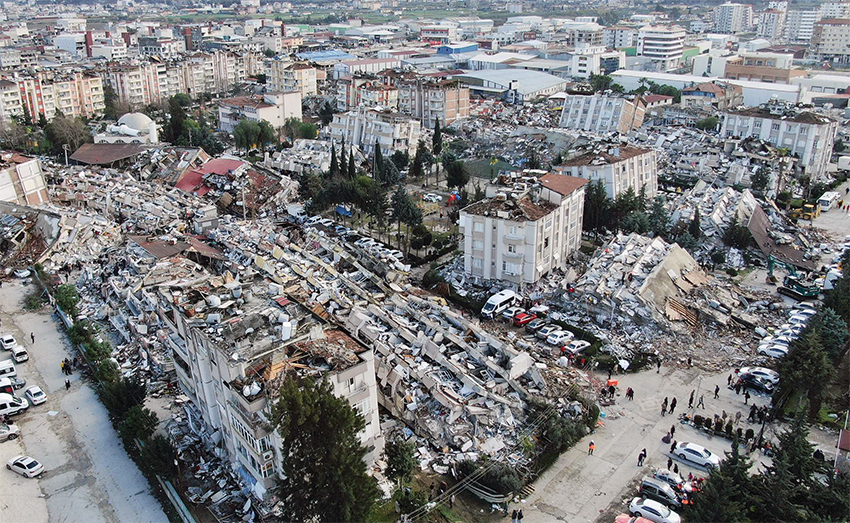08/02/2023
08/02/2023
GLOBAL RESCUE EFFORT HITS GROUND
GAZIANTEP, Turkey, Feb 8, (AP): With the hope of finding survivors fading, stretched rescue teams in Turkey and Syria searched Wednesday for signs of life in the rubble of thousands of buildings toppled by a catastrophic earthquake. The confirmed death toll from the world’s deadliest quake in more than a decade passed 11,000. Turkish President Recep Tayyip Erdogan toured a “tent city” in hard-hit Kahramanmaras where people forced from their homes were living.

Amid calls for his government to send more help to the disaster zone, Erdogan conceded initial shortfalls in the response to Monday’s 7.8 magnitude quake but vowed no one would “be left in the streets.” Search teams from more than two dozen countries have joined tens of thousands of local emergency personnel on the ground in Syria and Turkey. But the scale of destruction from the earthquake and its powerful aftershocks was so immense and spread over such a wide area, including places isolated by Syria’s ongoing civil war, that many people were still awaiting help.
Experts said the survival window for those trapped under the rubble of collapsed buildings or otherwise unable to access water, food, protection from the elements or medical attention was closing rapidly. At the same time, they said it was too soon to abandon hope for more rescues. “The first 72 hours are considered to be critical as the condition of people trapped and injured can deteriorate quickly and become fatal if they are not rescued and given medical attention in time,” Steven Godby, a natural hazards expert at Nottingham Trent University in England. Rescuers at times used excavators in their searches and picked gingerly through debris at other points to locate survivors or the dead. With thousands of buildings toppled, it was not clear how many people might still be caught in the rubble.
Turkey’s disaster management agency said Wednesday that the recovered bodies of people who died in the earthquake but cannot be identified would be buried within five days even if they remained unnamed. The agency, known as AFAD, said unidentified victims would be buried following DNA tests, finger printing and after being photographed for future identification.
The move is in line with Islamic funeral rites which require a burial to take place as quickly as possible after a person’s death. In the Turkish city of Malatya, bodies were placed side by side on the ground, covered in blankets, while rescuers waited for funeral vehicles to pick them up, according to former journalist Ozel Pikal, who said he saw eight bodies pulled from the ruins of a building. Pikal, who took part in the rescue efforts, said he thinks at least some of the victims froze to death as temperatures dipped to minus 6 degrees Celsius (21 Fahrenheit). “As of today there is no hope left in Malatya,” Pikal said by telephone.
“No one is coming out alive from the rubble.” Road closures and damage in the region made it hard to access all the areas that need help, he said, and there was a shortage of rescuers where he was. Meanwhile, cold hampered the efforts of those who were there, including volunteers. “Our hands cannot pick up anything because of the cold,” said Pikal. “Work machines are needed.” The region was already beset by more than a decade of civil war in Syria that has displaced millions in that country and left them reliant on humanitarian aid and sent millions more to seek refuge in Turkey.
Turkey’s president said the country’s death toll passed 8,500. The Syrian Health Ministry, meanwhile, said the death toll in government-held areas climbed past 1,200, while at least 1,400 people have in the rebel-held northwest, according to the volunteer first responders known as the White Helmets. That brought the overall total to 11,000 since Monday’s earthquake and multiple strong aftershocks. Tens of thousands more are injured. Syrian officials said the bodies of more than 100 Syrians who died during the earthquake in Turkey were brought back home for burial. Mazen Alloush, an official on the Syrian side of the border, said 20 more bodies were on their way, adding that all of them were Syrian refugees who fled civil war. Stories of rescues continued to provide hope that some people still trapped might be found alive. A crying newborn still connected by the umbilical cord to her deceased mother was rescued in Syria on Monday.
In Turkey’s Kahramanmaras, rescuers pulled a 3-year-old boy, Arif Kaan, from the rubble. “For now, the name of hope in Kahramanmaras is Arif Kaan,” a Turkish television reporter proclaimed as the dramatic rescue was broadcast to the country. Polish rescuers told TVN24 that low temperatures were working against them, though two firefighters said the fact that the predawn quake struck as many people were in bed under warm covers could help buy the search teams more time. But David Alexander, a professor of emergency planning and management at University College London, said data from past earthquakes suggested the likelihood of survival was now slim, particularly for individuals who suffered serious injuries or significant blood loss


